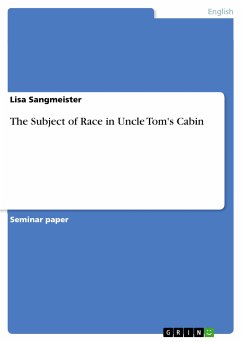Seminar paper from the year 2009 in the subject English Language and Literature Studies - Literature, grade: 1,3, University of Marburg (Institut für Amerikanistik), language: English, abstract: In the preface to Uncle Tom’s Cabin Harriet Beecher Stowe explained the purpose of her antislavery novel. She wanted “to awaken sympathy and feeling for the African race […]” (xiii). Stowe is more precise in her preface to A Key to Uncle Tom’s Cabin where she defines her goal of writing “to bring this subject of slavery, as a moral and religious question, before the minds of all those who profess to be followers of Christ in this country” (Stowe qtd. in Nuernberg 44). Stowe was successful and her sentimental novel reached the hearts of millions of readers and brought “[…] grown men to their emotional knees” (Yarborough 62). The novel did not only touch of the heart of the readers, it had as well political effects which can be underlined by the fact that Abraham Lincoln claimed that Stowe had caused the Civil War. This is one of the reasons why Josephine Donovan describes Uncle Tom’s Cabin as “probably the most influential novel ever written” (Donovan 11). This paper will deal with another level of the novel’s influence. In the Longman Dictionary the term “Uncle Tom” is defined as “a black person who is too respectful to white person”. This definition is an evidence for the fact that Uncle Tom “entered the stock of American cultural archetypes” (Yarborough 53). The label “Uncle Tom” has even become “an index for racial degradation” (Railton 104). This paper focuses on the contradiction between Stowe’s antislavery conviction and “her tendency to see characters as representatives types” (Donovan 49) of different races.


